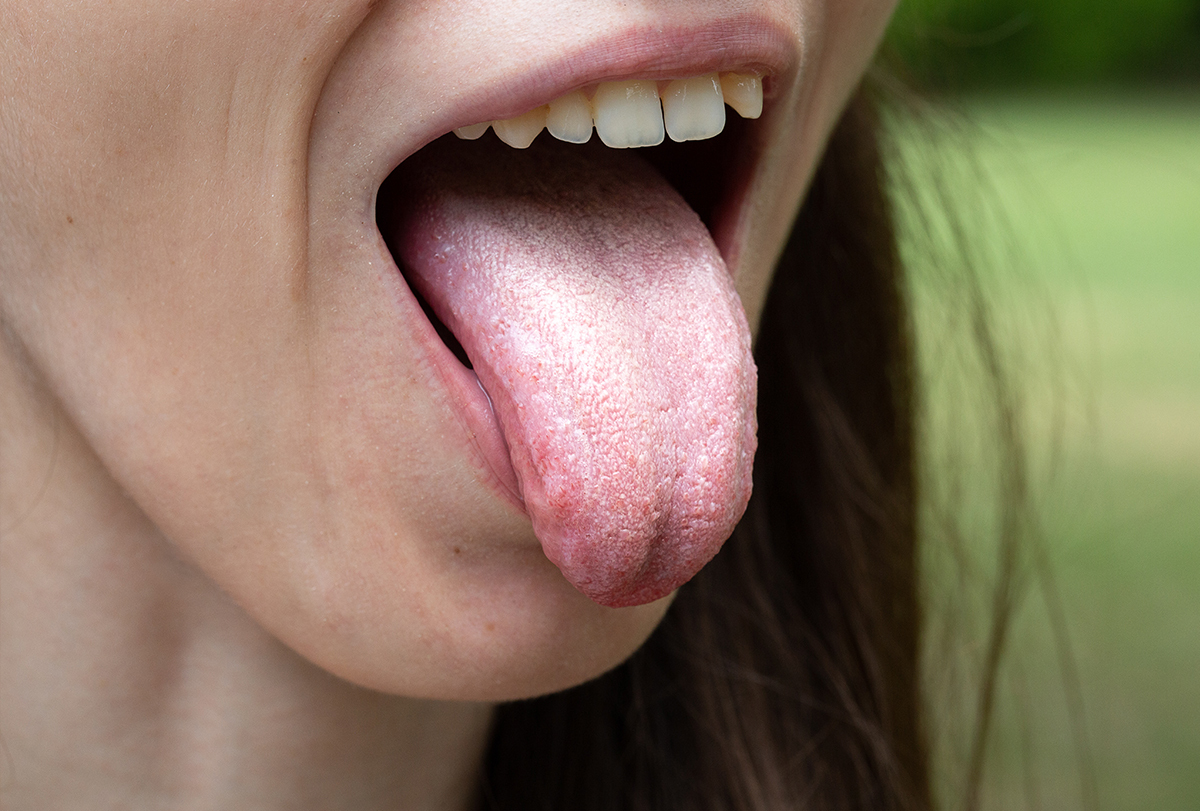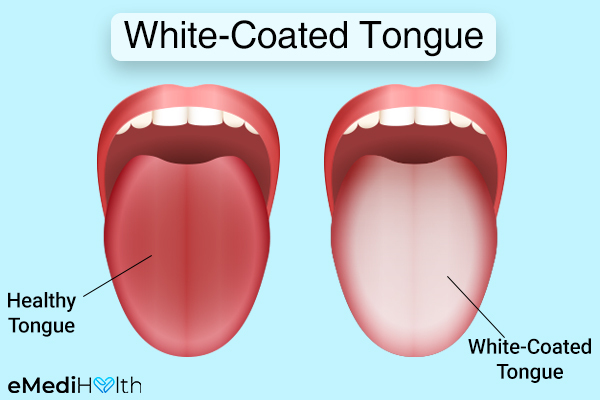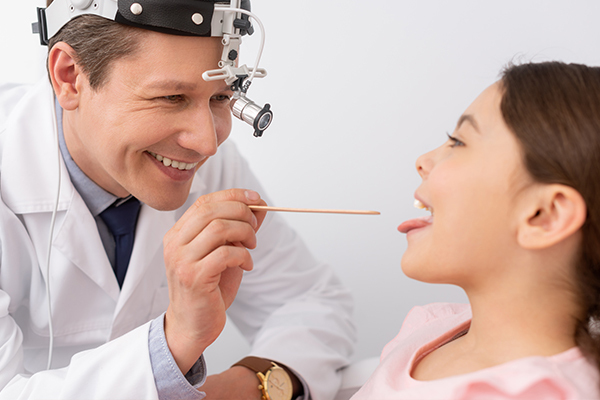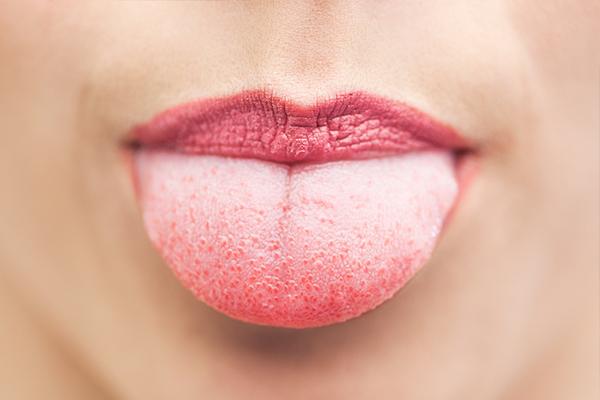In this article:
The appearance of your tongue is reflective of your inner health. When everything is running smoothly inside, your tongue gives off a natural pinkish hue without any signs of erratic pigmentation.

On the other hand, if your tongue appears to be covered with a grayish-white coating, either entirely or in patches, it is generally due to some underlying health issue.
This discoloration, commonly referred to as “white tongue,” may seem alarming but is mostly harmless and temporary. In rare cases, however, this condition can be symptomatic of a more serious ailment such as an infection or cancer.
Common Causes of White Tongue
Improper oral hygiene/care is one of the major reasons for white tongue.
Over time, bacteria, fungi, food debris, and dead cells can all get trapped between the papillae or tongue nodules, causing them to get inflamed and turning the tongue white.
Other usual culprits that lead to white tongue include:
- Dry mouth caused by sleeping with your mouth open or breathing through your mouth
- Dehydration
- Oral lichen planus, which is a chronic inflammatory disease that can trigger the appearance of white patches, papules, or plaques inside the mouth (1)
- Excessive alcohol intake, smoking, or tobacco use, which can irritate the lining of your mouth and lead to the development of thick, stubborn, premalignant lesions on the gums, the floor of the mouth, inside of the cheeks, and even tongue
- Geographic tongue, which is a condition that causes a map-like pattern to appear on the tongue
- Fever
- Certain medicines
- Skipping on brushing or flossing your teeth regularly, which can lead to the buildup of bacteria, food, and other kinds of debris within the oral cavity
- Severe diseases such as oral thrush (yeast infection) or syphilis, which can manifest as white tongue and require immediate medical attention
- Irritation to the tongue from sharp tooth edges or wearing dental instruments
Conditions Related to White Tongue: Signs and Symptoms

The white tongue is commonly caused by inadequate oral hygiene and is characterized by bad breath or a bitter taste in the mouth. However, in some cases, it can be a symptom of other oral health problems.
You can identify the underlying cause responsible for your white tongue by considering the symptoms that come along with it. Here are the common signs and symptoms of the white tongue according to its cause:
1. Leukoplakia
Leukoplakia causes white/gray striations in the mouth that are usually very stubborn and cannot be removed by scraping. (2) The patch tends to appear raised and is usually painless.
Most cases of leukoplakia are nonthreatening and tend to resolve once you limit your alcohol intake, quit smoking, and adhere to a stringent oral hygiene routine.
Note: If the lesions fail to subside despite the recommended care, you are advised to visit your dentist to rule out oral cancer or any other serious concern.
2. Oral lichen planus
A mild case of oral lichen planus is characterized by the appearance of white discoloration on the gums, tongue, or insides of the cheeks, which may go unnoticed at first as it usually develops painlessly.
In case of severe inflammation, you may experience considerable symptomatic discomfort in the mouth, especially when eating or drinking. You may experience a burning sensation in the mouth, and your gums may appear unusually red and be tender to the touch.
3. Geographic tongue
The patches associated with geographic tongue characteristically appear on the upper surface of the tongue or along its sides in the form of red, inflamed lesions surrounded by an uneven white-colored border.
In some cases, the patches may develop on the underside of the tongue as well. This condition has no permanent cure, but cutting down on spicy and acidic foods may reduce the sensitivity and provide some relief.
4. Oral thrush
In a typical case of oral thrush, your oral cavity is covered with superficial white patches that can usually be scraped away, leaving the underneath skin exposed and sometimes even bloody.
This kind of yeast infection makes your mouth or tongue feel like they are on fire and often leads to a blunted sense of taste or an unpleasant taste in the mouth. You may even notice red areas inside your mouth and throat and cracking of the skin around the corners of your mouth.
5. Syphilis
If you contract syphilis through oral sex, a tiny painless sore may appear on the tongue 10 days to 3 months after initial exposure to the infection-causing bacteria. If the condition is left untreated, it can advance to syphilitic leukoplakia, which is characterized by the formation of white plaques on the tongue.
Syphilis-induced tongue discoloration may be accompanied by headaches, fever, joint pain, and swollen glands. The signs and symptoms of the white tongue, regardless of the cause, tend to continue until the condition is treated.
Standard Medical Treatment for White Tongue

The treatment for the white tongue is determined according to its cause.
- For a white tongue due to a yeast infection such as oral thrush, the doctor will prescribe antifungal medicines, mostly oral drops to curb the fungal growth in your mouth. These antifungal meds should be taken for at least 1–2 weeks until the infection has run its course.
- For a white tongue due to oral lichen planus, which is a chronic inflammatory condition, the doctor will usually treat it with corticosteroids if it acquires a severe form.
- For white patches due to leukoplakia, your doctor will keep a close eye on your oral cavity to make sure that the symptoms are not getting any worse. Your doctor may identify and advise you to eliminate any possible irritants that may contribute to this condition, such as tobacco.
- For white tongue caused by syphilis, the standard treatment is penicillin, an antibiotic that eliminates the infection-causing bacteria.
- Regardless of the cause, you are almost always advised to steer clear of any irritants that could impede your recovery, such as alcohol and tobacco.
When to See a Doctor
Seek medical help if you experience any of the following symptoms as these may indicate a more serious underlying cause of white tongue:
- Pain or burning sensation in the tongue
- Development of open sores
- Difficulty in chewing, swallowing, or talking
- Sudden weight loss
- Fever
- Skin rashes
- Persistence of the white plaque coating for longer than 2 weeks
Expert Answers (Q&A)
Answered by Dr. Wessam Atteya, BDS, FRACDS (Dentist)

Yes, long-term use of broad-spectrum antibiotics could lead to a white-coated tongue.
No. However, chronic conditions require investigation, as in rare cases they can be precancerous.
Yes, it is the most common cause of white tongue.
Final Word
A white tongue may not always require treatment. In most cases, it clears up on its own. To get rid of the problem, you can gently clean your tongue using a soft toothbrush or tongue scraper and consume a lot of water to flush out the bacteria and debris from your mouth.
It may, however, still require more treatment if it is caused by an underlying issue, such as dry mouth, dehydration, mouth breathing, oral thrush, and the ones mentioned above.
If the condition is allowed to go out of hand without proper and timely treatment, a white tongue can just as easily escalate into a more serious infection and spread to other areas of the body.

- Was this article helpful?
- YES, THANKS!NOT REALLY



